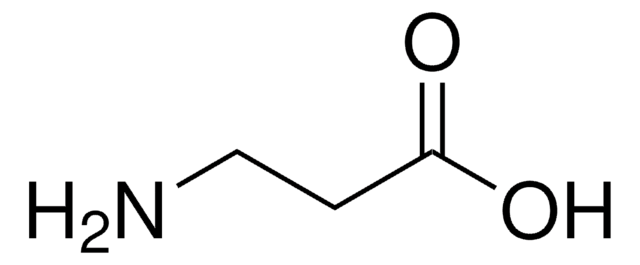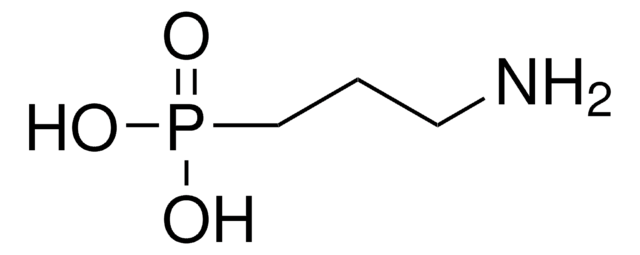123188
5-Aminovaleric acid
97%, for peptide synthesis
Synonym(s):
5-AVA, 5-Aminopentanoic acid, Homopiperidinic acid
Sign Into View Organizational & Contract Pricing
All Photos(1)
About This Item
Linear Formula:
NH2(CH2)4CO2H
CAS Number:
Molecular Weight:
117.15
Beilstein:
906833
EC Number:
MDL number:
UNSPSC Code:
12352106
PubChem Substance ID:
NACRES:
NA.22
Recommended Products
product name
5-Aminovaleric acid, 97%
Quality Level
Assay
97%
form
solid
reaction suitability
reaction type: solution phase peptide synthesis
mp
158-161 °C (lit.)
application(s)
peptide synthesis
SMILES string
NCCCCC(O)=O
InChI
1S/C5H11NO2/c6-4-2-1-3-5(7)8/h1-4,6H2,(H,7,8)
InChI key
JJMDCOVWQOJGCB-UHFFFAOYSA-N
Gene Information
human ... SLC15A1(6564)
Looking for similar products? Visit Product Comparison Guide
Application
5-Aminovaleric acid (5-AVA) is used:
- In the preparation of (5-AVA)x(MA)1-xPbI3, a perovskite for fabricating printable mesoscopic perovskite solar cell.
- As a spacer in the synthesis of rhenium and technetium-99m labeled insulin.
- To synthesize dipeptides that self-assemble to form nanotubes in the solid state as well as in solution over a wide range of pH.
- As a starting material in the total synthesis of an alkaloid, lycoposerramine Z.
Storage Class Code
11 - Combustible Solids
WGK
WGK 3
Flash Point(F)
Not applicable
Flash Point(C)
Not applicable
Personal Protective Equipment
dust mask type N95 (US), Eyeshields, Gloves
Choose from one of the most recent versions:
Already Own This Product?
Find documentation for the products that you have recently purchased in the Document Library.
Customers Also Viewed
cis-Decahydroquinolines via asymmetric organocatalysis: Application to the total synthesis of lycoposerramine Z.
Bradshaw B, et al.
Organic Letters, 15(2), 326-329 (2012)
A hole-conductor?free, fully printable mesoscopic perovskite solar cell with high stability.
Mei A, et al.
Science, 345(6194), 295-298 (2014)
Synthesis and characterization of rhenium and technetium-99m labeled insulin.
Sundararajan C, et al.
Journal of Medicinal Chemistry, 53(6), 2612-2621 (2010)
A Santos et al.
Clinical cancer research : an official journal of the American Association for Cancer Research, 6(5), 2012-2020 (2000-05-18)
7-Ethyl-10[4-(1-piperidino)-1-piperidino] carbonyloxy-camptothecin (CPT-11), a DNA topoisomerase I inhibitor, undergoes several metabolic pathways to generate conjugated and unconjugated derivatives that could be excreted from the body. The objective of this study was to determine the oxidative metabolites of CPT-11 recovered in
J C Fothergill et al.
Journal of general microbiology, 99(1), 139-155 (1977-03-01)
Pseudomonas aeruginosa PACI grows poorly on L-lysine as sole source of carbon but mutant derivatives which grow rapidly were readily isolated. Studies with one such mutant, P. aeruginosa PAC586, supported the existence of a route for L-lysine catabolism which differes
Our team of scientists has experience in all areas of research including Life Science, Material Science, Chemical Synthesis, Chromatography, Analytical and many others.
Contact Technical Service










